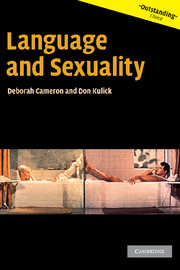Book contents
- Frontmatter
- Contents
- Preface
- 1 Making connections
- 2 Talking sex and thinking sex : the linguistic and discursive construction of sexuality
- 3 What has gender got to do with sex? Language, heterosexuality and heteronormativity
- 4 Sexuality as identity: gay and lesbian language
- 5 Looking beyond identity: language and desire
- 6 Language and sexuality: theory, research and politics
- Notes
- Bibliography
- Index
Preface
Published online by Cambridge University Press: 05 September 2012
- Frontmatter
- Contents
- Preface
- 1 Making connections
- 2 Talking sex and thinking sex : the linguistic and discursive construction of sexuality
- 3 What has gender got to do with sex? Language, heterosexuality and heteronormativity
- 4 Sexuality as identity: gay and lesbian language
- 5 Looking beyond identity: language and desire
- 6 Language and sexuality: theory, research and politics
- Notes
- Bibliography
- Index
Summary
A few years ago, US President Bill Clinton denied that he had ‘sexual relations’ with White House intern Monica Lewinsky, even though he admitted that she had performed oral sex on him on a number of occasions. Intrigued by this apparently illogical denial, two researchers from the Kinsey Institute for Research on Sex, Gender and Reproduction took it upon themselves to re-examine the findings of a 1991 study in which they had asked 600 undergraduates to complete a questionnaire (Sanders and Reinisch 1999). The question was: ‘would you say you “had sex” if the most intimate behavior you engaged in was …’. There followed a list of eleven intimate behaviours, and in each case respondents were asked if they would label the behaviour ‘having sex’. The results showed that, like President Clinton, 60% of respondents did not consider oral-genital contact as ‘having sex’; 20% did not even consider penile-anal intercourse as ‘having sex’.
The Kinsey re-study, and the Clinton–Lewinsky affair that prompted it, illustrate several important points about the relationship between language and sexuality. They show that our ideas about sex are bound up with the language we use to define and talk about it. They show that what is or isn't considered to be ‘sex’ is by no means a simple or straightforward matter: if 60% of younger Americans agreed with the President that fellatio was not ‘sex’, then 40% thought it was ‘sex’.
- Type
- Chapter
- Information
- Language and Sexuality , pp. ix - xviPublisher: Cambridge University PressPrint publication year: 2003



